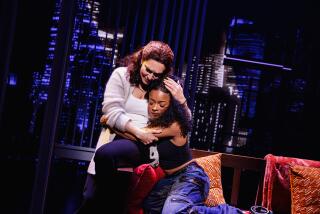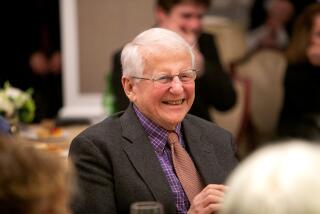Pagliacci : KENNETH TYNAN: Letters.<i> Edited By Kathleen Tynan (Random House: 642 pp., $30)</i>
- Share via
If art is long and life is short, reviewing is barely the sizzle of spit on a hot iron. So why should we care about Kenneth Tynan, 18 years after his death and 40 years after his glory days as a theater critic in London?
Not for his part in devising “Oh! Calcutta!” and other minor scandals of the ‘60s and ‘70s; nor even for his spirited and significant role in choosing plays at Britain’s National Theatre under Sir Laurence Olivier. And not even, fine as they were, for the portraits of theater, film and television figures--Olivier, Johnny Carson, Mel Brooks, among others--that he wrote for the New Yorker in the years before he died in 1980.
Rather, it is for such things as this vision of Ralph Richardson playing Falstaff at the Old Vic in the mid-1940s:
“Richardson never rollicked or slobbered or staggered: It was not a sweaty fat man, but a dry and dignified one. As the great belly moved, step following step with great finesse lest it overtopple, the arms flapped fussily at the sides as if to paddle the body’s bulk along. It was deliciously and subtly funny, not riotously so.” Later, when Prince Hal becomes Henry V and rejects Falstaff, Tynan writes:
“With his back to the audience Richardson thumped forward to welcome the new king, his whilom jackanapes; and after the key-cold rebuke which is his answer, the old man turned, his face red and working in furious tics to hide his tears. The immense pathos of his reassuring words to Shallow even now wets my eyes; ‘I shall be sent for soon at night.’ He hurried, whispered through the line very energetically, as if the whole matter were of no consequence: The emptiness of complete collapse stood awfully behind it.”
When Tynan published his first collection of reviews in 1950 at age 23, some of the British press compared him to William Hazlitt and George Bernard Shaw. An exaggeration in most respects, but in one sense it is absolutely accurate. Tynan’s passion to know theater in his early and best years fits the Aristotelian definition of “to know.” It is “to become.” Tynan’s reviews were not simply the description and analysis of what was working or failing on the stage but the feat of hoisting the reader onstage as well.
Innocence is a seldom-remarked essential for reviewing, as opposed to academic criticism, which generally excludes it. It may be odd to say of such a baroquely mannered personage--as the years passed, the baroque tended to droop into splintered anxiety--but the key to Tynan’s critical genius was a kind of innocent openness.
This and the fact that in Britain he wrote for himself, confident--out of youthful expansiveness and his country’s theatrical tradition--that he represented his readers. In the United States, he wrote for his readers, in no way confident of representing them. It was the difference between eating and administering food, and it showed. His New Yorker reviews, unlike the portraits, lack gullet.
Ten years ago, Tynan’s widow Kathleen, a journalist and novelist, wrote his biography. She then began editing his letters, a task she completed, despite illness, shortly before her death. They are a different and remarkable kind of biography: a rare example of a collection of letters that is better than the letters themselves.
Tynan’s middle name was Peacock, appropriately as well as literally. (Also complicatedly: His father lived a double life as Sir Peter Peacock in the town of Warrington, where he had a regular family, and as Peter Tynan in Birmingham, where he lived with Kenneth’s mother.) Tynan’s letters are spectacular displays; but intimacy, which is one requisite for a great letter, and passion, which is another, are undermined by a sense of performance.
Both the love and the subsequent pain he declared so eloquently to his two wives (his first was Elaine Dundy, the novelist) were no doubt genuine. But they suggest a man setting a brilliant scene and checking it in a viewfinder. At Oxford, where he made his debut in a purple suit and yellow satin shirt, one woman he courted remarked: “I couldn’t marry a man who was first at a mirror before me.”
Most of the preening comes in the early letters; the very first one has the 10-year-old Tynan writing the local paper to praise Bogart. Indulged, he had money to go to the theater and movies and buy a monocle. At his prep school--the venerable King Edward’s--he established himself as a character with such success that two students in the girls’ section interviewed him as the subject of their novel.
Many of the teenage letters, written to a friend, detail his pursuit of girls. We see very little of them; mostly we see Tynan, sometimes victorious and sometimes upended. (When one of his targets sent him word that she was in isolation, he hurried around anticipating parental absence, kissed her enthusiastically at the door and only then learned that she had scarlet fever.)
Even then, though, he was keeping a theater diary, and one letter objects that Sir Donald Wolfit’s performance as Shylock was too powerful. It unbalanced the play, he wrote with precocious critical acuteness, “which is too slight to bear the weight of tragedy.”
The Oxford letters recount a share of carefully carpentered seductions but are largely dedicated to recording personal glory. He went not just to be there but to operate there and established himself so successfully as a theatrical enfant terrible that a student publication, Isis, named him as one of six leading university personalities. His direction of student productions and his writing gained him an avant-garde reputation in London, and after his graduation in 1949, he worked steadily, first as a director and then as a reviewer. From 1953 to 1958, a golden time for theater and for him, he was critic for the weekly Observer.
The letters and notes tell of his subsequent stay in New York as the New Yorker critic, a time of pleasurable celebrity and a failing first marriage. They tell of his 10 years at the National Theatre and his fight to put on controversial plays, successful at first but leading to increasingly deadly opposition from the theater’s board. They tell of his courtship of and marriage to Kathleen, of marital difficulties and infidelities, of flounderings among various unsuccessful projects and one--”Oh! Calcutta!”--that succeeded but earned him criticism that wounded him deeply.
There was a vulnerability; Tynan lived to shock but couldn’t live with the consequences. He was not swift enough to fly out from his own sonic boom, and--along with the ravages of emphysema--it destroyed him. There were some peaceful last years in California writing the New Yorker profiles, but by then his health was gone.
For all the wit and savor of the letters, they lack continuous habitation. This is what Kathleen Tynan has so splendidly supplied. Her notes do far more than fill in gaps. They are the play in which the letter-writing Tynan figures as player; they give him life, often painful (and often, in a troubled marriage, painful for her). They bring in the opposing players against whom Tynan so elegantly volleyed.
Thanks to Kathleen, the story is a whole one, of which the letters themselves are only a part. For instance, the tragicomic falling-out between Olivier and Tynan toward the end of their brilliant 10-year reign at the National Theatre has the letters to display Tynan as excitable gadfly and the notes to show the tricky Olivier as an aging lion with a lazy, lethal swat.
Entertaining as many of the letters are--”If a stage or film show causes me to have an erection,” he writes to the former archbishop of Canterbury on behalf of titillation, “my immediate reaction is gratitude for a nice experience”--the collection follows a melancholy curve of decline. The letters only suggest it; Kathleen cites an entry in her husband’s journal that expresses the full bleakness:
“I disbelieve in art because I no longer believe that there is a secret something inside me which, when properly expressed, will take on a higher reality and deserve the name of ‘art.’ ”
It is a dismal long way from the visionary fire of Tynan’s theater writing in the ‘40s and ‘50s. In one review, he had noted Olivier’s odd detachment from his tremendous stage effects; his refusal to solicit the audience’s affection or even its judgment. “Olivier,” he wrote, “makes no such attempts to insist, and invites no moral response: simply the thing he is shall make him live.”
At some point, early, Tynan lost hold of the thing he was, beneath the preening and peacockery. That fierce knowing of the theater, that will to become it, had dwindled. Nothing else would entirely make him live.
More to Read
The biggest entertainment stories
Get our big stories about Hollywood, film, television, music, arts, culture and more right in your inbox as soon as they publish.
You may occasionally receive promotional content from the Los Angeles Times.










